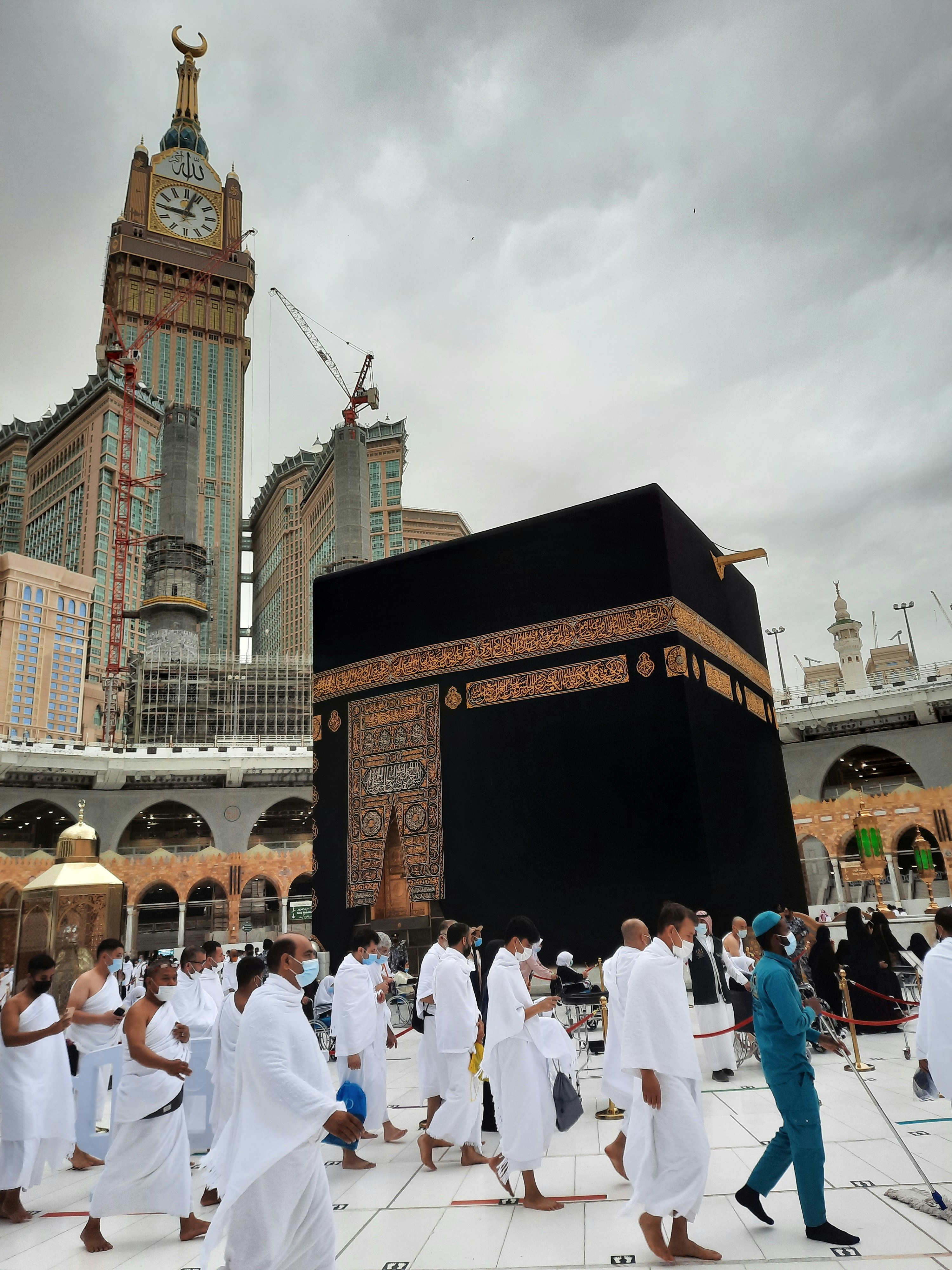Understanding the Difference Between Hajj and Umrah: Similarities, Differences, and Significance.
Introduction to Hajj and Umrah
There are certain acts of worship that shake the soul in a way nothing else can. For the believer, standing before the House of Allah is not just a ritual—it’s a deeply spiritual homecoming. Whether one sets out for the minor pilgrimage, Umrah, or embarks on the major pilgrimage, Hajj, both journeys are soaked in submission, humility, and love for Allah ﷻ. But while the two may appear similar on the surface, they hold distinct purposes, rituals, and rulings.
As Muslims, it is vital for us to understand not only how to perform these acts of worship but also the meanings behind them. What is it that sets Hajj apart from Umrah? Why is one compulsory while the other is optional? What wisdom lies in the difference between them?
Let us explore these sacred acts of devotion with the light of knowledge and love for Allah ﷻ guiding our hearts.
Check out some books on Hajj and Umrah- A list of Books On Hajj
Hajj and Umrah are two significant pilgrimage practices in Islam that hold immense importance for Muslims around the world. Both serve as acts of devotion and submission to Allah, allowing believers to express their faith, seek forgiveness, and enhance their spiritual connection. Though often mentioned together, Hajj and Umrah are distinct in terms of their timing, rituals, and obligatory status.
The Hajj pilgrimage takes place annually during the Islamic month of Dhul-Hijjah, attracting millions of Muslims who travel to the holy city of Mecca in Saudi Arabia. It is a mandatory religious duty for all able-bodied Muslims who can afford to undertake it at least once in their lifetime. The rituals of Hajj are prescribed and follow a specific sequence, including essential acts such as standing at Arafat, throwing stones at the Jamaraat, and performing Tawaf. This pilgrimage culminates in Eid al-Adha, a festival of sacrifice celebrated by Muslims globally.
On the other hand, Umrah, often referred to as the ‘minor pilgrimage,’ can be performed at any time of the year and is not obligatory. Despite its non-mandatory status, it holds significant spiritual merit and is highly encouraged in Islamic teachings. The rituals of Umrah include performing Tawaf, walking between the hills of Safa and Marwah, and shaving or cutting one’s hair. While the two pilgrimages share certain rituals, Umrah is generally shorter and less elaborate than Hajj.
Both Hajj and Umrah serve to reinforce the ideals of unity, humility, and equality among Muslims, as they gather to worship in the same sacred site, wearing simple garments that symbolize their devotion. Understanding the nuances of Hajj and Umrah can enrich one’s appreciation of these profound acts of worship and their significance in the life of a Muslim.
| Characteristic | Hajj | Umrah |
| Frequency | Annually during the month of Dhul-Hijjah | Can be performed at any time of the year |
| Obligatory Status | Mandatory for able-bodied Muslims who can afford it | Not obligatory, but highly encouraged |
| Significance | Considered one of the five pillars of Islam | Holds significant spiritual merit |
| Rituals | Standing at Arafat, throwing stones at the Jamaraat, Tawaf | Tawaf, walking between Safa and Marwah, shaving or cutting hair |
| Duration and Elaboration | Longer and more elaborate | Shorter and less elaborate than Hajj |

What Is Hajj?
Hajj is one of the five pillars of Islam—an obligation upon every Muslim who is physically and financially able to perform it once in a lifetime. It is performed annually during the Islamic month of Dhul-Hijjah, from the 8th to the 13th. Those who meet the criteria, such as being physically and financially capable, have a religious obligation to undertake this pilgrimage at least once in their lifetime. This pilgrimage reinforces the unity of Muslims worldwide, as millions gather in Mecca, Saudi Arabia, participating in various rituals that symbolize key elements of their faith.
The significance of Hajj is deeply rooted in the legacy of Prophet Ibrahim (AS), Hajar (AS), and our beloved Prophet Muhammad ﷺ. It is a reenactment of their sacrifices, struggles, and complete trust in Allah ﷻ. Every ritual of Hajj is rich with historical and spiritual meaning, reminding the believer of submission, patience, and devotion.
Hajj not only connects individuals to their religious roots but also emphasizes essential Islamic values, such as humility, equality, and devotion to God. Hajj is a time for reflection, spiritual cleansing, and a reaffirmation of one’s faith, making it a vital journey for any Muslim striving for a deeper connection with their Creator.
What Is Umrah?
Umrah, often referred to as the “lesser pilgrimage,” is a sunnah act of worship that can be performed at any time of the year. It consists of fewer rituals and is not obligatory, yet it is Sunnah, Highly emphasised and greatly rewarding.
Umrah involves entering the state of ihram, performing tawaf (circumambulation) around the Kaaba, doing sa’i between Safa and Marwah, and concluding with a haircut or trim (halq or taqsir). Though shorter and simpler than Hajj, Umrah holds a special place in a believer’s life, especially for those seeking spiritual renewal, forgiveness, and nearness to Allah ﷻ.
Despite the lesser status compared to Hajj, Umrah provides an opportunity for Muslims to earn immense spiritual rewards and draw closer to their faith, thus serving as a vital component of Islamic practice for millions around the globe. The essence of Umrah lies in its ability to serve both as a personal journey of reflection and a communal expression of devotion among believers.
Key Similarities Between Hajj and Umrah
Despite their differences, Hajj and Umrah share a few key rituals and spiritual purposes:
1. Ihram – The State of Purity and Intention
Both Hajj and Umrah require pilgrims to enter a state of ihram—a sacred state of purity where certain actions are prohibited. It symbolizes leaving behind worldly identities and focusing entirely on the Creator.
2. Tawaf – Circling the Kaaba
Both pilgrimages involve tawaf, the moving of hearts and feet in love around the Kaaba, echoing the movements of the angels around the Throne of Allah.
3. Sa’i – Walking Between Safa and Marwah
Pilgrims reenact Hajar’s (AS) desperate search for water by walking between the hills of Safa and Marwah, a reminder of trust in Allah even in moments of despair.
4. Spiritual Purpose
Both Hajj and Umrah bring immense spiritual rewards. They offer the chance for sins to be forgiven, hearts to be cleansed, and souls to return home to Allah ﷻ.
Major Differences Between Hajj and Umrah

Spiritual Significance of Hajj
https://www.facebook.com/reel/632480516454890
The annual pilgrimage of Hajj holds profound spiritual significance for Muslims around the globe. It represents more than just a physical journey to the holy city of Mecca; it embodies the essence of complete submission to Allah. This pilgrimage is an obligation for all able-bodied Muslims at least once in their lifetime, emphasizing its critical role in the Islamic faith. This act of devotion acts as a reminder of the ultimate purpose of life, which is to worship and obey Allah, reinforcing the belief that every aspect of existence is a manifestation of divine will.
One of the key elements of Hajj is the embodiment of unity among Muslims. During this sacred pilgrimage, millions of individuals from diverse backgrounds and cultures converge in Mecca, wearing identical Ihram garments, which symbolize equality and humility before Allah. This communal aspect not only affirms shared beliefs but also creates a powerful sense of belonging within the Muslim Ummah, or community. The collective experience fosters bonds that transcend geographical, linguistic, and cultural barriers, highlighting the idea that every individual is part of a larger spiritual tapestry.
Additionally, Hajj serves as a catalyst for personal spiritual growth. The rituals performed during the pilgrimage—such as standing at Arafat, the Tawaf around the Kaaba, and the stoning of the devil at Mina—encourage introspection and self-improvement. Each act reinforces the journey towards purification and renewal of faith, allowing pilgrims to reflect on their lives and seek forgiveness for their sins. The emotional and spiritual transformation experienced during Hajj can profoundly impact one’s relationship with Allah, as it is a moment of deep reflection and commitment.
Overall, the spiritual significance of Hajj emerges from both its individual and collective dimensions. It nurtures a profound connection to faith, the community, and the divine, ultimately enhancing the overall Muslim identity while emphasizing the essence of submission to Allah.
Spiritual Significance of Umrah
Umrah, often regarded as a lesser pilgrimage compared to Hajj, holds profound spiritual significance for Muslims worldwide. This voluntary act of worship, while not obligatory, is immensely cherished by believers, as it offers a unique opportunity for spiritual rejuvenation and self-reflection. Performing Umrah is believed to cleanse one’s sins, providing a chance to seek forgiveness from Allah and grow spiritually. The act of circling the Kaaba and traversing the path between Safa and Marwah serves as both a physical journey and a symbolic one, encouraging pilgrims to abandon Worldly concerns and connect deeply with their faith.
The spiritual benefits of Umrah extend beyond mere acts of worship. Engaging in this pilgrimage fosters inner peace and tranquility. The rituals involved, such as prayer, supplication, and meditation, open pathways for personal reflection. This spiritual cleanliness and moments of contemplation allow pilgrims to reassess their lives and set new spiritual resolutions. It becomes a time for sincere repentance, gratitude, and renewal of one’s commitment to Islamic principles.
Moreover, the blessings and rewards associated with Umrah are significant. It’s often mentioned that each Umrah performed washes away one’s past misdeeds, thus allowing a sense of relief and hope among participants. The emotional and psychological benefits cannot be overstated; many find themselves feeling rejuvenated and grounded after completing their pilgrimage. Additionally, the communal aspect of Umrah, where individuals from diverse backgrounds gather in worship, strengthens the bonds of brotherhood and sisterhood among Muslims, further emphasizing its importance in the spiritual landscape of Islam. Thus, Umrah serves as a vital means for Muslims to enhance their spirituality and deepen their connection with Allah.
Duas for Bidding Farewell,Dua to say when someone leaves for Hajj or a journey
A Note to the Seeker
Whether you are planning your first Umrah, saving for Hajj, or have already been blessed with both—know that these journeys are not only for the feet but also for the soul. Every step taken, every tear shed, every du’a whispered at the Kaaba or in Arafah—is written with ink that only Allah ﷻ reads.
If Allah invites you for Hajj, know that He has honored you beyond words. And if He invites you for Umrah, feel chosen, seen, and loved. Not everyone receives this invitation—so prepare your heart before you prepare your passport.
Call to Action: Preparing for Your Pilgrimage
As you contemplate the profound experience of either Hajj or Umrah, it is essential to begin your preparations well in advance. Planning these significant pilgrimages requires not only logistical arrangements but also deep spiritual consideration. Whether you choose to embark on the compulsory Hajj or Umrah, taking the necessary steps to prepare can greatly enhance your journey and lead to a more fulfilling spiritual experience.
First and foremost, familiarize yourself with the rituals and practices associated with each pilgrimage. Numerous resources are available, including books, online courses, and informative websites dedicated to Hajj and Umrah. These platforms provide valuable insights into the required rites, the history of the pilgrimage, and tips to navigate potential challenges you may face during your travels. Engaging with experienced individuals or participating in community workshops can also enrich your understanding and offer practical advice based on real experiences.
Physical preparation is equally important as spiritual readiness. Pilgrimage involves considerable walking, especially during Hajj, where participants often encounter large crowds. Incorporating a fitness routine into your daily life can help build stamina and endurance. Additionally, ensuring you have all necessary travel documents ready, including your passport, visa, and any permits required for Hajj, will mitigate stresses commonly associated with travel.

Finally, be mindful that the pilgrimage is not just about completing the rituals; it is about personal growth and spiritual awakening. Reflect on your intentions and what you hope to gain from the experience. Whether it is seeking forgiveness, finding peace, or deepening your connection to faith, conveying your desires through prayer and meditation will elevate your pilgrimage.
By preparing diligently, you can embark on your pilgrimage with confidence, both physically and spiritually equipped to embrace the transformative journey that lies ahead.
Final Thoughts
Hajj and Umrah are two of the greatest gifts Allah ﷻ has given to this Ummah. While one is a fard and the other a sunnah, both have the power to transform us inwardly. Let us strive not only to perform these rituals but to live by the lessons they teach: sincerity, humility, patience, and complete trust in Allah.
May Allah grant every Muslim the opportunity to visit His House, again and again, with hearts full of love and lips filled with Labbaik.
Ameen.
Advice for thise who cannot go for Hajj
Discover more from Islam Hashtag
Subscribe to get the latest posts sent to your email.





